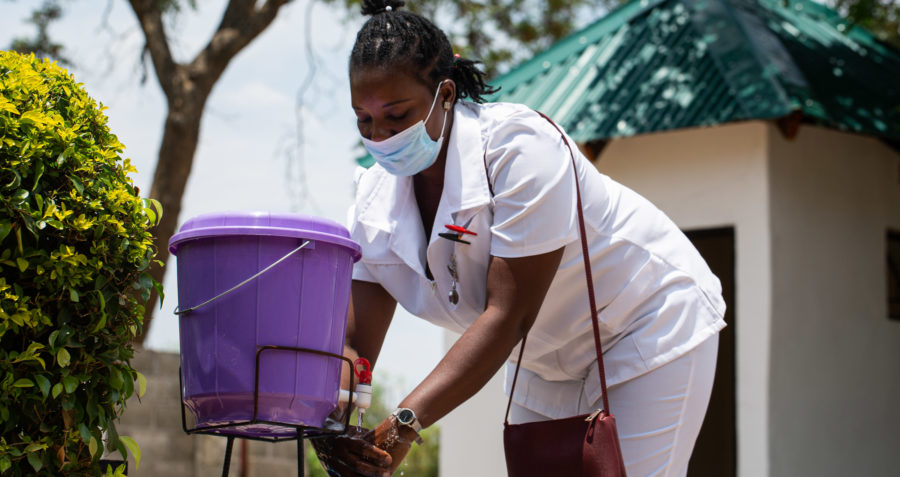COVID-19 risks undoing a decade of HIV prevention, frontline activists warn
 Frontline AIDS / Tony Kawimbe / Arete 2020
Frontline AIDS / Tony Kawimbe / Arete 2020
The fight against AIDS has been hard hit by COVID-19, new reports released today by Frontline AIDS show.
The findings support those of UNAIDS’ latest report, which cautions that COVID-19 related disruptions may result in up to 293,000 additional HIV infections globally by the end of 2022.
In response to the findings, Frontline AIDS is warning new pressures thrown up by the pandemic threaten to undo the last decade of crucial HIV prevention work.
Developed in partnership with community organisations each year, the HIV prevention Shadow Reports analyse the HIV prevention responses of countries with some of the highest HIV burdens in the world: Kenya, Malawi, Mozambique, Nigeria, Ukraine, Uganda and Zimbabwe.
Taken collectively, the reports paint a worrying picture. They show even prior to the outbreak of the pandemic, little progress had been made against the UNAIDS 2020 Prevention Road Map.
Since the outbreak of COVID-19, the situation has only deteriorated. The pandemic has forced some HIV prevention services to shut and has slowed down, if not completely halted national and sub-national decision-making processes which are crucial to implementing change, such as drug policy reform, sexual education roll outs and the prohibition of forced marriage.
Even when these actions are taken, benefits are not filtered down to individuals at highest risk – including the LGBT community, sex workers and people who use drugs. Stigma, discrimination and violence against these groups are an ongoing barrier to HIV prevention across all seven nations, despite their efforts to address legal and social barriers.
The reports also highlight an increase in human rights violations and violence against women and marginalised groups reported during lockdowns. In Uganda, 24 LGBT people were arrested from a homeless shelter in March under the pretence of lockdown restrictions, whilst in in Zimbabwe, lockdown also exacerbated the high rates of gender-based violence and there was a spike in human rights abuses.
Funding allocated to HIV prevention continues to be inadequate and is mainly funded by international donors. In Mozambique, spending on HIV prevention interventions totalled just 8% of the total amount available (US $46 million) in 2019. Malawi’s HIV response in fiscal year 2018/2019 was almost entirely (90%) funded by international donors, whilst donor funding also accounts for almost 90% of total expenditure in Uganda. With the current risk of GDP and donor funding declining further in response to COVID-19, the charity has warned that countries must commit to raising more domestic funding and increasing their budgets for HIV prevention.
The implementation of quality services also continues to be a challenge. The reports indicate services are often concentrated in urban areas, meaning coverage is generally poor. Data collected in 2020 shows only 42% of priority districts offer prevention packages dedicated to young women and their male partners in Mozambique, despite young women being disproportionately affected by HIV. In Zimbabwe, service coverage reaches just 17% of adolescent girls and young women, whilst in Uganda, only 31% of high incidence districts had programmes dedicated to young women in 2019.
Coverage is also inconsistent in Ukraine, where only 11% of men who have sex with men, 40% of sex workers and 48% of people who inject drugs are routinely reached by services. Only 5.8% of the estimated number of people who use opiates in Ukraine are covered with Opioid Substitution Therapy programmes, according to the Public Health Centre, is despite this group being more susceptible to contracting HIV.
Christine Stegling, Executive Director comments: “COVID-19 has brought huge additional pressures to HIV prevention services, which were already falling behind the 2020 Prevention Targets set in 2016. But it has also highlighted an opportunity – that when faced with an emergency, governments can mobilise additional resources and be persuaded to do unprecedented things. Our Shadow Reports reinforce UNAIDS modelling that things are rapidly moving in the wrong direction and we could see up to 293,000 additional HIV infections globally due to COVID-19 related disruptions.”
“We have got to act now, to persuade Governments that HIV prevention is an emergency too and to help them to be brave and face up to the things which need changing – decriminalisation, stigma and discrimination in healthcare settings, harmful gender norms and comprehensive sexuality education. Without addressing these difficult subjects, our efforts to meet the 2030 targets are likely to fail yet again.”
Tags
HIV prevention


